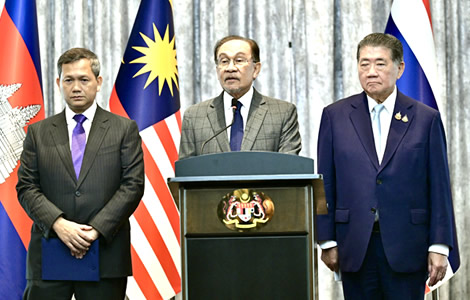Ceasefire takes hold across Thai-Cambodian border after last-minute Cambodian offensive fails. Officials to review security before allowing civilians to return. ASEAN-led talks in Kuala Lumpur brokered the deal, aiming to restore peace amid fragile calm and ongoing tensions.
Despite a last-ditch offensive by Cambodian forces to seize ground in key battle zones, the guns fell silent at midnight. The ceasefire kicked in across the Thai-Cambodian border as the clock struck Tuesday, July 29th. Thai military and navy reports confirmed that hostilities had halted. But the calm remains fragile. Top Thai officials and the National Security Council are set to assess the situation Tuesday morning before greenlighting the return of displaced civilians. The ceasefire followed high-stakes talks in Kuala Lumpur. Acting Prime Minister Phumtham Wechayachai led a powerful Thai delegation in face-to-face negotiations with Cambodian Prime Minister Hun Manet. Malaysian Prime Minister Anwar Ibrahim chaired the tense, last-minute summit that brought both sides back from the brink.

A tense calm returned to the Thai-Cambodian border just after midnight on Tuesday, July 29, 2025. The silence followed a ceasefire agreement signed the day before in Kuala Lumpur, Malaysia. The deal was reached after nearly a week of intense cross-border clashes. The violence displaced over 300,000 civilians on both sides of the border.
Importantly, the ceasefire came into effect at exactly 24:00 local time. Both sides agreed to halt military activity immediately. However, before the deadline, the situation remained volatile and unstable.
In the final ten minutes before the ceasefire, fierce combat erupted between Thai and Cambodian troops.
Cambodian offensive prompts last-minute Thai strikes before ceasefire begins at midnight at border
Heavy weapons, including mortars and rocket launchers, were reportedly used. Additionally, two Royal Thai Air Force F-16 fighter jets struck key Cambodian positions. These included Phu Phi, Ta Muen Thom, and Ta Kwai — areas previously occupied by Cambodian troops.
Nevertheless, it will take some time for the scars of this short-lived but bitter conflict to heal. Earlier, two Thai soldiers were killed on Monday evening in the latest, fiercest fighting. They were Private First Class Siravich Phinyosuk, assigned to the 2nd Infantry Battalion, 8th Infantry Regiment, and Sergeant Major Anothai Pongkaew, assigned to the Special Operations Battalion.
The F16 strikes were a direct response to a last-minute offensive by Cambodian forces. Thai troops defended their positions and held ground successfully.
Soon after midnight, all firing ceased.
According to military sources, no casualties were reported in the final skirmishes. Nonetheless, destruction in the affected areas is still being assessed.
Significantly, senior Cambodian General Sray Duc was reported killed during the earlier fighting. He served as deputy commander of the Cambodian army and commander of the 3rd Support Division. General Sray was also a known ally of former Prime Minister Hun Sen. His death is considered a serious blow to the Cambodian command.
Earlier this year, General Sray represented Cambodia in military talks with Thai commanders. He helped negotiate troop withdrawals from the Chong Bok area in June. His role in the recent conflict was critical until the moment of his death.
Before the ceasefire, clashes had intensified since the end of the previous week. Cambodian forces launched sudden advances in disputed territories. These included border regions around Phu Phi, Ta Muen Thom, and Prasat Don Tuan.
Thailand responds to border incursions with force as Cambodian troops push hard across disputed areas
In response, Thailand reinforced its defensive lines. The Royal Thai Army deployed artillery and air support to resist incursions. Fighting was particularly heavy in Surin and Sisaket provinces.
Consequently, over 160,000 Thais were evacuated from the conflict zone. Emergency shelters were set up across at least seven provinces. The Ministry of Interior coordinated the evacuation with support from the military.
Similarly, Cambodia reported over 140,000 displaced civilians. Relief agencies are now racing to provide aid to affected populations on both sides.
As of Tuesday morning, all active fighting had ended across known hotspots. Areas such as Prasat Ta Muen, Chong Chom, and Huai Tamaria suddenly quietened. Moreover, the Royal Thai Navy confirmed that firing had stopped in Trat Province as well.
At 6:00 AM, Thai officials will begin assessing the situation. By 9:30 AM, a National Security Council (NSC) meeting will be held in Bangkok. Government spokesman Jirayu Huangsap confirmed the meeting’s agenda. The NSC will review the ceasefire’s impact and discuss the repatriation of evacuees.
Ceasefire holds as Thai government begins review to determine when civilians may safely return home
However, a final decision on resettlement will be deferred until after midday. Authorities asked displaced persons to remain in shelters one more night for safety.
At 7:00 AM, military commanders from both countries are to meet. This informal session will bring together the 1st and 2nd Army Regions of Thailand and the 4th and 5th Army Regions of Cambodia. Importantly, ASEAN assistant defence attachés will also observe.
Both parties reportedly agreed to maintain communication and prevent future incidents.
The next major milestone is set for August 4, when the General Border Committee (GBC) will convene. Cambodia will host this high-level dialogue. It is expected to address border demarcation, force positioning and future cooperation.
The ceasefire itself was brokered in Malaysia. Prime Minister Anwar Ibrahim chaired the negotiations in his role as ASEAN Chair. Acting Thai Prime Minister Phumtham Vejjayachai and Cambodian Prime Minister Hun Manet led their respective delegations.
Military leaders meet under ASEAN guidance to prepare for the next stage of border dialogue on August 4
During the press briefing, Prime Minister Anwar announced the full terms of the ceasefire. First, all hostilities were to stop immediately. Second, military commanders would meet early the next day. Finally, the GBC would resume talks within one week.
He also thanked both leaders for showing restraint. “This is a very important first step,” Anwar stated. “Peace and stability are essential for the region.”
Acting Prime Minister Phumtham described the talks as productive and cooperative. He emphasised Thailand’s readiness to return to bilateral frameworks. Moreover, he thanked Malaysia for its diplomatic role and praised ASEAN unity.
Phumtham returned to Bangkok late Monday night. After landing at Don Mueang Military Airport, he took a phone call from U.S. President Donald Trump.
According to officials, President Trump congratulated the Thai leadership. He also welcomed Thailand’s cooperation with peace efforts. Trump reaffirmed that trade talks with Thailand would now continue as scheduled.
ASEAN-led summit secures breakthrough as leaders push to restore calm and recommit to peaceful solutions
Meanwhile, U.S. Secretary of State Marco Rubio released a statement. “The United States welcomes the ceasefire,” it read. “We urge both parties to honour their commitments and end this conflict permanently.”
The U.S. also thanked Malaysia for hosting the talks. It pledged ongoing support for ASEAN-led peace initiatives.
Cambodian Prime Minister Hun Manet also welcomed the ceasefire. He praised the talks as a “very good meeting.” Moreover, he emphasised the humanitarian urgency. “More than 300,000 people have been displaced,” he noted.
Hun Manet thanked Prime Minister Anwar, President Trump, and the Chinese government for their efforts. He also acknowledged Phumtham’s constructive role in the dialogue.
Despite the ceasefire, both sides remain cautious. Thai officials have stated they will monitor the border closely in the coming days. They also warned that future violations would be met with appropriate responses.
World endorses truce as Thailand and Cambodia prepare for fragile peace and long-term security steps
According to military analysts, the last gasp attacks were triggered by Cambodian attempts to gain last-minute territorial leverage. Thailand, however, was quick to respond with coordinated defence.
Tragically, the brief war has claimed many lives on both sides. On Monday evening, two Thai soldiers were confirmed killed in action. Private First Class Siravich Phinyosuk and Sergeant Major Anothai Pongkaew died during one of the final battles. Their units were engaged near Phu Makhuea.
The Royal Thai Army expressed condolences to their families. Military honours are expected later this week.
On Tuesday afternoon, Thai officials will begin preparing for a civilian return. The Ministry of Transport is coordinating buses and trucks to assist with relocation. Local administrations are also helping to assess damage in evacuated areas.
While no further fighting has been reported, recovery will take time. Field hospitals remain active, and humanitarian supplies continue to be distributed.
As calm settles in conflict zone, Thai authorities prepare safe civilian return and post-battlefield recovery
Nevertheless, the ceasefire provides a critical opening. It allows both sides to de-escalate. However, rebuilding trust will not be easy. The upcoming GBC meeting on August 4 will be crucial for long-term peace.
For now, the Thai government has urged its population to remain calm. It has also encouraged communities to support returning evacuees. Significantly, it is urging all civilians to wait for official updates regarding the security situation.
Acting PM travels to Kuala Lumpur for ceasefire talks. Cambodia’s PM Hun Manet to attend amid PR war
In the aftermath of the conflict, ASEAN leaders are calling for renewed commitment to regional security frameworks. Diplomats believe that continued dialogue is the only path forward.
Nonetheless, Thailand has learned some painful realities from this conflict. Certainly, chief among them is that it is living alongside a dangerous neighbour.
As the dust settles, one truth is clear: peace is fragile, it is still possible, but Thailand is also cautious.
Join the Thai News forum, follow Thai Examiner on Facebook here
Receive all our stories as they come out on Telegram here
Follow Thai Examiner here
Further reading:
Acting PM travels to Kuala Lumpur for ceasefire talks. Cambodia’s PM Hun Manet to attend amid PR war
Hot War rages on the Thai-Cambodian border following Cambodian troops offensive in Chong Bok area


















